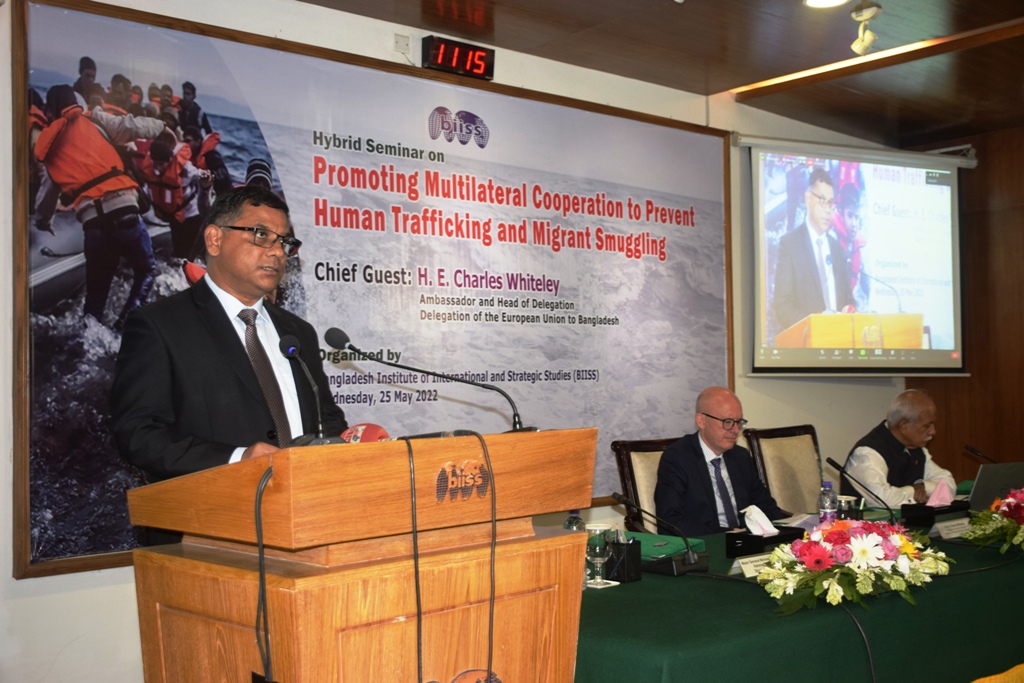Seminar on Promoting Multilateral Cooperation to Prevent Human Trafficking and Migrant Smuggling on 25 May 2022
DATE: 2022-05-25
Bangladesh Institute of International and Strategic Studies (BIISS) organized a Hybrid Seminar on “Promoting Multilateral Cooperation to Prevent Human Trafficking and Migrant Smuggling” on Wednesday, 25 May 2022 at the BIISS auditorium. Ambassador H.E. Charles Whiteley, Head of Delegation, Delegation of the European Union to Bangladesh, graced the occasion as the Chief Guest. Ambassador Kazi Imtiaz Hossain, PAA, Chairman, BIISS, chaired the inaugural session and Major General Mohammad Maksudur Rahman, OSP, BSP, psc Director General, BIISS, delivered the welcome address.
In his welcome address, Major General Mohammad Maksudur Rahman, OSP, BSP, psc stated that Bangladesh is aware of the increasing challenges of human trafficking. The country is therefore making continuous efforts to facilitate safe and orderly overseas migration on one hand and to prevent the two crimes on the other hand. For this purpose, he emphasized on extensive dialogue and participation of stakeholders in the decision-making process of the government.
Speaking as a Chief Guest, Ambassador and the Head of Delegation of the European Union to Bangladesh, His Excellency Charles Whiteley, noted that the refugee issue has become one of the hot and red button topics in Europe. He acknowledged that the European Union has a great deal of interest in working together to curb human trafficking and migrant smuggling by promoting multilateral cooperation. He highlighted the importance of the new pact of the EU on migration and asylum in this regard. Ambassador Whiteley acknowledged Bangladesh’s initiatives to curb human trafficking and migrant smuggling. He added that in line with EU priorities in the region and new strategy on combating trafficking in human beings for the period 2021-2025, it is supporting the efforts of the government of Bangladesh to tackle trafficking and smuggling. He referred to GLO.ACT project in this regard.
Kazi Imtiaz Hossain, paa, Chairman, Bangladesh Institute of International and Strategic Studies stressed on Bangladesh’s “zero tolerance” policy against human trafficking. He referred to Bangladesh’s multi-pronged approach to human trafficking which encompass ‘prevention, promotion, protection, and partnership’ and involves all key stakeholders. Finally, he eemphasized on ensuring universal acceptance and application of international conventions and related protocols on human trafficking and migrant smuggling.
The inaugural session was followed by a working session chaired by Professor Dr. Tasneem Siddiqui, Department of Political Science, University of Dhaka.
Benuka Ferdousi, Research Fellow, BIISS delivered on “Human Trafficking and Migrant Smuggling: Global and Bangladesh Perspective”. She explored various aspects of these two crimes at both national and global level such as extent of the crimes, profile of victims and perpetrators, routes etc. Then she elaborated on the drivers of Human trafficking and Migrant Smuggling. Finally, she highlighted the security implications of these two crimes.
Mr Md. Obaidul Haque, Associate Professor, International Relations, University of Dhaka, presented on “Human Trafficking and Migrant Smuggling: The Challenges”. He identified the capacity of different actors to prevent, protect and prosecute these crimes as the first and foremost challenge in this regard. This, according to him, has been exacerbated by global crises such as the Covid-19 pandemic and the Russia-Ukraine war, which have impacted the ways the transnational criminal syndicates involved in these crimes operate and added even newer dimensions.
Ms. Yujin Park, Program Manager of Migration and Protection Unit, International Organization for Migration (IOM), Bangladesh presented on “Multilateral Cooperation to Prevent Human Trafficking and Smuggling of Migrants- Global Perspectives”. She talked about the existing global instruments that define human trafficking, smuggling and exploitation and explained how international cooperation is enshrined in such instruments which act as a guiding framework. She also elaborated on some global and regional initiatives to combat these crimes
Asif Munir, Migration and Displacement Specialist, talked on “Multilateral Cooperation to Prevent Human Trafficking and Smuggling of Migrants: Bangladesh Perspective”. He highlighted on the role of the regional consultative process (RCP), Bali process, SAARC and ASEAN. He touched upon the shifting of priorities in regionalism and the changing nature of geopolitical interests while evaluating the 20 years of the Bali process and analyzing the effectiveness of such arrangements for countries like Bangladesh. In Bangladesh case, he also gave example of some positive results in this regard.
Professor Siddiqui argued that human trafficking and migrant smuggling is a very deep-rooted problem. She suggested that while discussing prevention of trafficking and smuggling, it is important to keep in mind the different drivers of human trafficking and migrant smuggling. Besides, it is also crucial to change the vocabulary from victims to survivors, make the trafficking discourse more participatory and right based and equip the victims to strike back.
The working session was followed by a vibrant open discussion session. In her concluding remark, Professor Dr. Tasneem Siddiqui, Department of Political Science, University of Dhaka, emphasized on rapidly evolving routes and techniques used by human traffickers and migrant smugglers. She suggested that while discussing prevention of trafficking and smuggling, it is important to keep in mind the different drivers of human trafficking and migrant smuggling. Besides, it is also crucial to change the vocabulary from victims to survivors, which make the trafficking discourse more participatory and right based and equip the victims to strike back.








